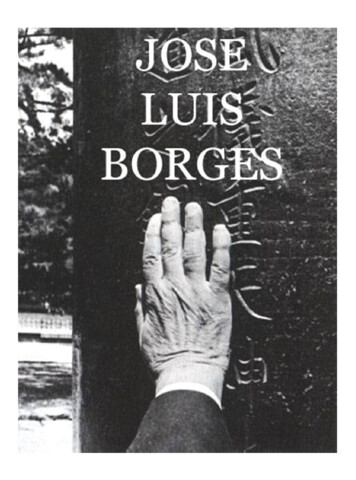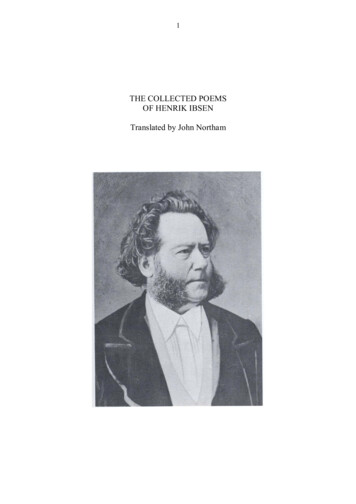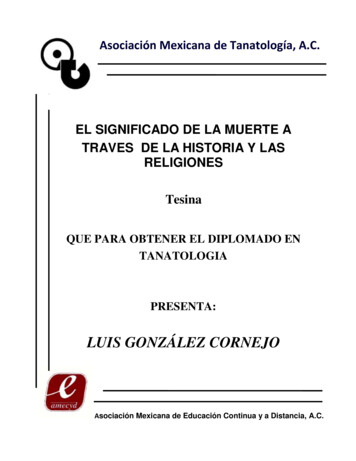
Transcription
FICCIONESJorge Luis BorgesTranslated byAndrew HurleyALLEN LANETHE PENGUIN PRESSPublished by the Penguin Group
ContentsA UNIVERSAL HISTORY OF INIQUITY (1935)Preface to the First EditionPreface to the 1954 EditionThe Cruel Redeemer Lazarus MorellThe Improbable Impostor Tom CastroThe Widow Ching—PirateMonk Eastman, Purveyor of IniquitiesThe Disinterested Killer Bill HarriganThe Uncivil Teacher of Court Etiquette --Kôtsukéno SukéHakim, the Masked Dyer of MervMan on Pink CornerEtceteraIndex of SourcesFICTIONS (1944)THE GARDEN OF FORKING PATHS (1941)ForewordTlön, Uqbar, Orbis TertiusPierre Menard, Author of the QuixoteThe Circular RuinsThe Lottery in BabylonA Survey of the Works of Herbert QuainThe Library of BabelThe Garden of Forking Paths
ARTIFICES (1944)ForewordFunes, His MemoryThe Shape of the SwordThe Theme of the Traitor and the HeroDeath and the CompassThe Secret MiracleThree Versions of JudasThe EndThe Cult of the PhoenixThe SouthTHE ALEPH (1949)The ImmortalThe Dead ManThe TheologiansStory of the Warrior and the Captive MaidenA Biography of Tadeo Isidoro Cruz (1829-1874)Emma ZunzThe House of AsterionThe Other DeathDeutsches RequiemAverroës' SearchIbn-Hakam al-Bokhari, Murdered in HisLabyrinthThe Two Kings and the Two LabyrinthsThe Wait
The Man on the ThresholdThe AlephAfterwordTHE MAKER (1960)Foreword: For Leopoldo LugonesThe MakerDreamtigersA Dialog About a DialogToenailsCovered MirrorsArgumentum OrnithologicumThe CaptiveThe MountebankDelia Elena San MarcoA Dialog Between Dead MenThe PlotA ProblemThe Yellow RoseThe WitnessMartín FierroMutationsParable of Cervantes and the QuixoteParadiso, XXXI, 108Parable of the PalaceEverything and NothingRagnarökInferno, 1, 3
Borges and IMUSEUMOn Exactitude in ScienceIn Memoriam, J.F.K.AfterwordIN PRAISE OF DARKNESS (1969)ForewordThe EthnographerPedro SalvadoresLegendA PrayerHis End and His BeginningBRODIE'S REPORT (1970)ForewordThe InterloperUnworthyThe Story from Rosendo JuárezThe EncounterJuan MurañaThe Elderly LadyThe DuelThe Other DuelGuayaquil
The Gospel According to MarkBrodie's ReportTHE BOOK OF SAND (1975)The OtherUlrikkeThe CongressThere Are More ThingsThe Sect of the ThirtyThe Night of the GiftsThe Mirror and the Mask"Undr"A Weary Man's UtopiaThe BribeAvelino ArredondoThe DiskThe Book of SandAfterwordSHAKESPEARE'S MEMORY (1983)August 25, 1983Blue TigersThe Rose of ParacelsusShakespeare's MemoryA Note on the TranslationAcknowledgmentsNotes to the Fictions
A Universal History of Iniquity (1935)I inscribe this book to S.D. — English,innumerable, and an Angel.Also: I offer her that kernel of myself that Ihave saved, somehow— the central heart thatdeals not in words, traffics not with dreams,and is untouched by time, by joy, byadversities.Preface to the First EditionThe exercises in narrative prose thatconstitute this book were performed from 1933to 1934. They are derived, I think, from my rereadings of Stevenson and Chesterton, from thefirst films of von Sternberg, and perhaps from aparticular biography of the Argentine poetEvaristo Carriego. *Certain techniques areoverused: mismatched lists, abrupt transitions,the reduction of a person's entire life to two orthree scenes. (It is this pictorial intention thatalso governs the story called "Man on PinkCorner.") The stories are not, nor do theyattempt to be, psychological.
With regard to the examples of magic thatclose the book, the only right I can claim tothem is that of translator and reader. Isometimes think that good readers are poets assingular, and as awesome, as great authorsthem-selves. No one will deny that the piecesattributed by Valéryto his pluperfect MonsieurEdmond Testeare worth notoriously less thanthose of his wife and friends.Reading, meanwhile, is an activitysubsequent to writing—more re-signed, morecivil, more intellectual.J.L.B.Buenos Aires May 27,1935Preface to the 1954 EditionI would define the baroque as that style thatdeliberately exhausts (or tries to exhaust) itsown possibilities, and that borders on selfcaricature. In vain did Andrew Lang attempt, inthe eighteen-eighties, to imitate Pope'sOdyssey; it was already a parody, and sodefeated the parodist's attempt to exaggerate its
tautness. "Baroco" was a term used for one ofthe modes of syllogistic reasoning; theeighteenth century applied it to certain abusesin seventeenth-century architecture andpainting. I would venture to say that thebaroque is the final stage in all art, when artflaunts and squanders its resources. Thebaroque is intellectual, and Bernard Shaw hassaid that all intellectual labor is inherentlyhumorous. This humor is unintentional in theworks of Baltasar Gradan *but intentional, evenindulged, in the works of John Donne.The extravagant title of this volumeproclaims its baroque nature. Softening itspages would have been equivalent to destroyingthem; that is why I have preferred, this once, toinvoke the biblical words quod scripsi, scripsi(John 19:22), and simply reprint them, twentyyears later, as they first appeared. They are theirresponsible sport of a shy sort of man whocould not bring himself to write short stories,and so amused himself by changing anddistorting (sometimes without aestheticjustification) the stories of other men. From
these ambiguous exercises, he went on to thearduous composition of a straightforward shortstory—"Man on Pink Corner"—which he signedwith the name of one of his grandfather'sgrandfathers, Francisco Bustos; the story hashad a remarkable, and quite mysterious,success.In that text, which is written in the accents ofthe toughs and petty criminals of the BuenosAires underworld, the reader will note that Ihave interpolated a number of “cultured” words- entrails, conversion , etc. I did this becausethe tough, the knife fighter, the thug, the typethat Buenos Aires calls the compadre orcompadrito, aspires to refinement, or (and thisreason excludes the other, but it may be thetrue one) because compadres are individualsand don't always talk like The Compadre, whichis a Platonic ideal.The learned doctors of the Great Vehicleteach us that the essential characteristic of theuniverse is its emptiness. They are certainlycorrect with respect to the tiny part of theuniverse that is this book.
Gallows and pirates fill its pages, and thatword iniquity strikes awe in its title, but underall the storm and lightning, there is nothing. Itis all just appearance, a surface of images—which is why readers may, perhaps, enjoy it.The man who made it was a pitiable sort ofcreature, but he found amusement in writing it;it is to be hoped that some echo of that pleasuremay reach its readers.In the section called Et cetera I have addedthree new pieces.J.L.B.The Cruel Redeemer Lazarus MorellTHE REMOTE CAUSEIn 1517, Fray Bartolomé de las Casas, feelinggreat pity for the Indians who grew worn andlean in the drudging infernos of the Antilleangold mines, proposed to Emperor Charles Vthat Negroes be brought to the isles of theCaribbean, so that they might grow worn and
lean in the drudging infernos of the Antilleangold mines. To that odd variant on the speciesphilanthropist we owe an infinitude of things:W. C. Handy's blues; the success achieved inParis by the Uruguayan attorney-painter PedroFigari*; the fine runaway-slave prose of thelikewise Uruguayan Vicente Rossi*; themythological stature of Abraham Lincoln; thehalf-million dead of the War of Secession; the 3.3 billion spent on military pensions; thestatue of the imaginary semblance of Antonio(Falucho) Ruiz*; the inclusion of the verb"lynch" in respectable dictionaries; theimpetuous King Vidor film Hallelujah; thestout bayonet charge of the regiment of "Blacksand Tans" (the color of their skins, not theiruniforms) against that famous hill near Montevideo*; the gracefulness of certain elegantyoung ladies; the black man who killed MartínFierro; that deplorable rumba The PeanutSeller;the arrested and imprisonedNapoleonism of Toussaint L'Ouverture; thecross and the serpent in Haiti; the blood ofgoats whose throats are slashed by the papalois
machete; the habanera that is the mother of thetango; the candombe. And yet another thing:the evil and magnificent existence of the cruelredeemer Lazarus Morell.*THE PLACEThe Father of Waters, the Mississippi, thegrandest river in the world, was the worthystage for the deeds of that incomparableblackguard. (Alvarezde Pineda discovered thisgreat river, though it was first explored byHernando de Soto, conqueror of Peru, whowhiled away his months in the prison of theInca Atahualpa teaching his jailer chess. Whende Soto died, the river's waters were his grave.)The Mississippi is a broad-chested river, a darkand infinite brother of the Paraná, the Uruguay,the Amazon, and the Orinoco. It is a river ofmulatto-hued water; more than four hundredmillion tons of mud, carried by that water,insult the Gulf of Mexico each year. All thatvenerable and ancient waste has created a deltawhere gigantic swamp cypresses grow from theslough of a continent in perpetual dissolution
and where labyrinths of clay, dead fish, andswamp reeds push out the borders and extendthe peace of their fetid empire. Upstream,Arkansas and Ohio have their bottom-lands,too, populated by a jaundiced and hungrylooking race, prone to fevers, whose eyes gleamat the sight of stone and iron, for they knowonly sand and driftwood and muddy water.THE MENIn the early nineteenth century (the periodthat interests us) the vast cotton plantations onthe riverbanks were worked from sunup tosundown by Negro slaves. They slept in woodencabins on dirt floors.Apart from the mother-child relationship,kinship was conventional and murky; the slaveshad given names, but not always surnames.They did not know how to read. Their softfalsetto voices sang an English of drawn-outvowels. They worked in rows, stooped under theoverseer's lash. They would try to escape, andmen with full beards would leap astridebeautiful horses to hunt them down with baying
dogs.Onto an alluvium of beastlike hopefulnessand African fear there had sifted the words ofthe Scripture; their faith, therefore, wasChristian. Go down, Moses, they would sing,low and in unison. The Mississippi served themas a magnificent image of the sordid Jordan.The owners of that hard-worked land andthose bands of Negroes were idlers, greedygentlemen with long hair who lived in widefronted mansions that looked out upon theriver—their porches always pseudo-Greek withcolumns made of soft white pine. Good slavescost a thousand dollars, but they didn't lastlong. Some were so ungrateful as to sicken anddie. A man had to get the most he could out ofsuch uncertain investments. That was why theslaves were in the fields from sunup tosundown; that was why the fields were made toyield up their cotton or tobacco or sugarcaneevery year. The female soil, worn and haggardfrom bearing that impatient culture's get, wasleft barren within a few years, and a formless,clayey desert crept into the plantations.
On broken-down farms, on the outskirts ofthe cities, in dense fields of sugarcane, and onabject mud flats lived the "poor whites"; theywere fisher-men, sometime hunters, horsethieves. They would sometimes even beg piecesof stolen food from the Negroes. And yet intheir prostration they held one point of pride—their blood, untainted by "the cross of color"and unmixed. Lazarus Morell was one of thesemen.THE MANThe daguerreotypes printed in Americanmagazines are not actually of Morell. Thatabsence of a genuine likeness of a man asmemorable and famous as Morell cannot becoincidental. It is probably safe to assume thatMorell refused to sit for the silvered plate—essentially, so as to leave no pointless traces;incidentally, so as to enhance his mystery. Wedo know, however, that he was not particularlygood-looking as a young man and that his closeset eyes and thin lips did not conspire in hisfavor. The years, as time went on, imparted to
him that peculiar majesty that white-hairedblackguards, successful (and unpunished)criminals, seem generally to possess. He was aSouthern gentleman of the old school, in spiteof his impoverished childhood and his shamefullife. He was not ignorant of the Scriptures, andhe preached with singular conviction. "I oncesaw Lazarus Morell in the pulpit," wrote theowner of a gambling house in Baton Rouge,"and I heard his edifying words and saw thetears come to his eyes. I knew he was afornicator, a nigger-stealer, and a murderer inthe sight of the Lord, but tears came to my eyestoo."Another testimony to those holy outpouringsis provided by Morell himself: "I opened theBible at random, put my finger on the first versethat came to hand—St. Paul it was—andpreached for an hour and twenty minutes.Crenshaw and the boys didn't put that time tobad use, neither, for they rounded up all thefolks' horses and made off with 'em. We sold'em in the state of Arkansas, all but one baystallion, the most spirited thing youever laid
eyes on, that I kept for myself. Crenshaw hadhis eye on that horse, too, but I convinced himit warn't the horse for him."THE METHODHorses stolen in one state and sold inanother were but the merest digression inMorell's criminal career, but they did prefigurethe method that would assure him his place in aUniversal History of Iniquity. His method wasunique not only because of the sui generiscircumstances that shaped it, but also becauseof the depravity it required, its vilemanipulation of trust, and its gradual evolution,like the terrifying unfolding of a nightmare. AlCapone and Bugs Morano operate with lavishcapital and subservient machine guns in a greatcity, but their business is vulgar. They fight for amonopoly, and that is the extent of it.In terms of numbers, Morell at one timecould command more than a thousand swornconfederates.There were two hundred in the Heads, orGeneral Council, and it was the Heads that gave
the orders that the other eight hundredfollowed. These "strikers," as they were called,ran all the risk. If they stepped out of line, theywould be handed over to the law or a rockwould be tied to their feet and their bodieswould be sunk in the swirling waters of theriver. Often, these men were mulattoes. Theirwicked mission was this:In a momentary wealth of gold and silverrings, to inspire respect, they would roam thevast plantations of the South. They wouldchoose some wretched black man and offer himhis freedom. They would tell him that if he'drun away from his master and allow them toresell him on another plantation far away, theywould give him a share of the money and helphim escape a second time. Then, they said,they'd convey him to free soil. Money andfreedom — ringing silver dollars and freedom toboot — what greater temptation could they holdout to him? The slave would work up thecourage for his first escape.The river was a natural highway. A canoe, thehold of a riverboat, a barge, a raft as big as the
sky with a pilothouse on the bow or with a roofof canvas sheeting . the place didn't matter;what mattered was knowing that you weremoving, and that you were safe on theunwearying river. They would sell him onanother plantation. He would run away again,to the sugarcane fields or the gullies. And itwould be then that the fearsome and terriblebenefactors (whom he was beginning to distrustby now) would bring up obscure "expenses" andtell him they had to sell him one last time.When he escaped the next time, they told him,they'd give him his percentage of the two sales,and his liberty. The man would let himself besold, he would work for a while, and then hewould risk the dogs and whips and try to escapeon his own. He would be brought back bloody,sweaty, desperate, and tired.THE FINAL FREEDOMWe have not yet considered the legal aspectof the crime. The Negro would not be put up forsale by Morell's henchmen until his escape hadbeen advertised and a reward offered for his
capture. At that point, anybody could lay holdof the slave. Thus, when he was later sold, it wasonly a breach of trust, not stealing, and it waspointless for the owner to go to law, since he'dnever recover his losses.All this was calculated to leave Morell's mindat ease, but not forever. The Negro could talk;the Negro was capable, out of pure gratitude ormisery, of talking. A few drinks of rye whisky ina whorehouse in Cairo, Illinois, where the slaveborn son of a bitch went to squander some ofthose silver dollars burning a hole in his pocket(and that they'd no reason to give him, when itcame right down to it), and the cat would be outof the bag. The Abolitionist Party was makingthings hot in the North during this time—a mobof dangerous madmen who denied a man's rightto his own property, preached the freeing of theblacks, and incited the slaves to rebellion.Morell was not about to let himself be confusedwith those anarchists. He was no Yankee, hewas a Southerner, a white man, the son andgrandson of white men, and he hoped somedayto retire from his business and be a gentleman
and possess his own league upon league ofcotton fields and his own bow-backed rows ofslaves. With his experience, he was not a man totake point-less risks.The runaway expected his freedom.Therefore, the nebulous mulattoes of LazarusMorell would give a sign (which might havebeen no more than a wink) and the runawaywould be freed from sight, hearing, touch,daylight, iniquity, time, benefactors, mercy, air,dogs, the universe, hope, sweat—and fromhimself. A bullet, a low thrust with a blade, aknock on the head, and the turtles and catfish ofthe Mississippi would be left to keep the secretamong themselves.THE CATASTROPHEManned by trustworthy fellows, the businesswas bound to prosper. By early 1834, someseventy Negro slaves had been "emancipated"by Morell, and others were ready to follow theirfortunate forerunners. The zone of operationswas larger now, and new members had to beadmitted to the gang.
Among those who took the oath, there wasone young man, Virgil Stewart, from Arkansas,who very soon distinguished himself by hiscruelty. This boy was the nephew of agentleman who had lost a great number ofslaves. In August of 1834, he broke his vow anddenounced Morell and the others. Morell'shouse in New Orleans was surrounded by theauthorities, but Morell somehow (owing tosome oversight—or a bribe in the right quarters) managed toescape.Three days passed. Morell hid for that periodin an old house with vine-covered courtyardsand statues, on Toulouse Street. Apparently hehad almost nothing to eat and spent his daysroaming barefoot through the large, darkrooms, smoking a thoughtful cheroot. Througha slave in the house, he sent two letters toNatchez and another to Red River. On thefourth day, three men entered the house; theysat talking things over with Morell until almostdaybreak. On the fifth day, Morell got out ofbed at nightfall, borrowed a razor, and carefully
shaved off his beard. He then dressed and leftthe house. Slowly and calmly he made his waythrough the northern outskirts of the city.When he reached open country, out in thebottomlands of the Mississippi, he breathedeasier.His plan was one of drunken courage. Heproposed to exploit the last men that still owedhim respect: the accommodating Negroes of theSouth-land themselves. These men had seentheir comrades run away, and had not seenthem brought back. They thought, therefore,that they'd found freedom. Morell's plan calledfor a general uprising of the Negroes, thecapture and sack of New Orleans, and theoccupation of the territory. A pitiless anddepraved man, and now almost undone bytreachery, Morell planned a response ofcontinental proportions—a response in whichcriminality would become redemptive, andhistoric. To that end, he headed for Natchez,where his strength ran deeper. I reproduce hisown narration of that journey:"I walked four days," he reported, "and no
opportunity offered for me to get a horse. Thefifth day, I had stopped at a creek to get somewater and rest a while. While I was sitting on alog, looking down the road the way that I hadcome, a man came in sight riding on a goodlooking horse. The very moment I saw him, Iwas determined to have his horse. I arose anddrew an elegant rifle pistol on him and orderedhim to dismount. He did so, and I took hishorse by the bridle and pointed down the creek,and ordered him to walk before me. He went afew hundred yards and stopped. I . made himundress himself, all to his shirt and drawers,and ordered him to turn his back to me. Hesaid, 'If you are determined to kill me, let mehave time to pray before I die.' I told him I hadno time to hear him pray.He turned around and dropped on his knees,and I shot him through the back of the head. Iripped open his belly and took out his entrails,and sunk him in the creek. I then searched hispockets, and found four hundred dollars andthirty-seven cents, and a number of papers thatI did not take time to examine. I sunk the
pocket-book and papers and his hat, in thecreek. His boots were bran-new, and fitted megenteelly; and I put them on and sunk my oldshoes in the creek."I mounted as fine a horse as ever Istraddled, and directed my course forNatchez."*THE INTERRUPTIONMorell leading uprisings of Negroes thatdreamed of hanging him . Morell hanged byarmies of Negroes that he had dreamed ofleading . it pains me to admit that the historyof the Mississippi did not seize upon those richopportunities. Nor, contrary to all poetic justice(and poetic symmetry), did the river of hiscrimes become his tomb. On the 2nd ofJanuary, 1835, Lazarus Morell died ofpulmonary congestion in the hospital atNatchez, where he'd been admitted under thename Silas Buckley. Another man in the wardrecognized him. On that day, and on the 4th ofJanuary, slaves on scattered plantationsattempted to revolt, but they were put down
with no great loss of blood.The Improbable Impostor Tom CastroI give him that name because it was by thatname he was known (in 1850 or thereabouts)on the streets and in the houses of Talcahuano,Santiago de Chile, and Valparaiso, and it seemsonly fair that he take it again, now that he hasreturned to those lands—even if only as a ghost,or a Saturday-night amusement.1I have chosen this metaphor in order toremind the reader that these vile biographiesappeared in the Saturday supplement of anevening newspaperThe birth register in Wapping calls himArthur Orton, and gives the date of his birth asJune 7, 1834.We know that he was the son of a butcher,that his childhood was spent in the graymeanness of the London slums, and that heharkened to the call of the sea. That story is not
an un-common one; "running away to sea" wasthe traditional English way to break withparental authority—the heroic ritual ofinitiation. Geography recommended such acourse, as did the Scriptures themselves: "Theythat go down to the sea in ships, that dobusiness in great waters; these see the works ofthe Lord, and his wonders in the deep" (Psalms107:23-24). Orton fled his deplorable, dingypink-colored suburb and went down to the seain a ship; with ingrained disappointment heregarded the Southern Cross, and he jumpedship at Valparaiso. He was a gentle idiot.Though by all logic he could (and should) havestarved to death, his muddle-headed joviality,his permanent grin, and his infinite docilityearned him the favor of a certain family namedCastro, whose patronym he took ever after ashis own. No traces of his stay in South Americaremain, but we know that his gratitude neverflagged: in 1861 he turned up in Australia, stillbearing the name Tom Castro.In Sydney he made the acquaintance of aman named Ebenezer Bogle, a Negro servant.
Bogle, though not handsome, had that reposefuland monumental air, that look of wellengineered solidity, often possessed by a blackman of a certain age, a certain corporealsubstance, a certain authority. Bogle hadanother quality, as well—though sometextbooks in anthropology deny the attribute tohis race: he was possessed of genius. (We shallsee the proof of that soon enough.) He was atemperate, decent man, the ancient Africanappetites in him corrected by the customs andexcesses of Calvinism. Aside from thevisitations from his god (which we shalldescribe below), he was normal in every way;his only eccentricity was a deep-seated andshamefaced fear that made him hesitate atstreet corners and at crossings, survey east,west, north, and south, and try to outguess theviolent vehicle that he was certain would endhis days.Orton came upon his future friend oneafternoon as Bogle was standing on a run-downcorner in Sydney trying to screw up the courageto face his imagined death. After watching him
for several minutes, Orton offered him his arm,and the two astounded men crossed theinoffensive street. Out of that now-bygoneevening a protectorate was forged: themonumental, unsure Negro over the obeseWapping simpleton.In September of 1865, the two men read aheartbreaking piece of news in the local paper.THE ADORED ONE DECEASEDIn the waning days of April, 1854 (as Ortonwas inspiring the effusions of Chileanhospitality, which was as welcoming as thatcountry's patios), there had sunk in the watersof the Atlantic a steamship christened theMermaid, bound from Rio de Janeiro toLiverpool. Among the drowned had been oneRoger Charles Tichborne, an English militaryofficer brought up in France, and the firstbornson of one of England's leading Catholicfamilies. How-ever improbable it may seem, thedeath of this Frenchified young man (a youngman who had spoken English with the mostcultured of Parisian ac-cents and who had
inspired the unparalleled envy that can only bearoused by French intelligence, grace, andaffectation) was an event of supremeimportance in the destiny of Arthur Orton, whohad never so much as laid eyes on him. LadyTichborne, Roger's horrified mother, refused tobelieve the reports of his death. She publishedheartrending advertisements in all the majornewspapers, and one of those advertisementsfell into the soft, funereal hands of EbenezerBogle, who conceived a brilliant plan.THE VIRTUES OF UNLIKENESSTichborne had been a slim, genteel youngman with a reserved and some-what selfabsorbed air. He had sharp features, straightblack hair, tawny skin, sparkling eyes, and anirritatingly precise way of speaking.Orton was an irrepressible rustic, a "yokel,"with a vast belly, features of infinite vague-ness,fair and freckled skin, wavy light-brown hair,sleepy eyes, and no, or irrelevant, conversation.Bogle decided that it was Orion's duty to takethe first steamer for Europe and realize Lady
Tichborne's hope that her son had notperished—by declaring himself to be that son.The plan had an irrational genius to it. Let megive a simple example: If an impostor hadwanted to pass himself off as the emperor ofGermany and king of Prussia in 1914, the firstthing he'd have done would be fake theupturned mustaches, the lifeless arm, theauthoritarian scowl, the gray cape, theillustrious and much-decorated chest, and thehigh helmet.Bogle was more subtle: he would havebrought forth a smooth-faced Kaiser with nomilitary traits, no proud eagles whatsoever, anda left arm in unquestionable health. We have noneed of the metaphor; we know for a fact thatBogle produced a fat, flabby Tichborne with thesweet smile of an idiot, light-brown hair, and athoroughgoing ignorance of French. Bogle knewthat a perfect facsimile of the beloved RogerCharles Tichborne was impossible to find; heknew as well that any similarities he mightachieve would only underscore certaininevitable differences. He therefore gave up the
notion of likeness altogether. He sensed thatthe vast ineptitude of his pretense would be aconvincing proof that this was no fraud, for nofraud would ever have so flagrantly flauntedfeatures that might so easily have convinced.We should also not overlook the all-powerfulcollaboration of time: the vicissitudes offortune, and fourteen years of antipodean life,can change a man.Another essential argument in favor ofBogle's plan: Lady Tichborne's repeated andirrational advertisements showed that she wascertain that Roger Charles had not died, andthat she would will herself to recognize himwhen he came.THE MEETINGTom Castro, ever accommodating, wrote toLady Tichborne. In order to prove his identity,he invoked the irrefutable proof of the twomoles near his left nipple and that painful andtherefore unforgettable episode from hischildhood when a swarm of bees had attackedhim. The letter was brief and, in the image of
Bogle and Tom Castro, free of any scruples as tothe way words ought to be spelled. In hermajestic solitude in her hôtel particulier inParis, Lady Tichborne read and reread the letterthrough happy tears, and in a few days she hadrecaptured the recollections her son hadinvoked.On January 16, 1867, Roger CharlesTichborne called upon his mother. Hisrespectful servant, Ebenezer Bogle, precededhim. It was a winter day of bright sunshine;Lady Tichborne's tired eyes were veiled withtears. The black man threw the windows open.The light served as a mask; the motherrecognized the prodigal and opened her arms tohim. Now that she had him in the flesh, shemight do without his diary and the letters hehad written her from Brazil—the treasuredreflections of the son which had fed herloneliness through those fourteen melancholyyears. She returned them to him proudly; notone was missing.Bogle smiled discreetly; now he couldresearch the gentle ghost of Roger Charles.
AD MAJOREM DEI GLORIAMThat joyous recognition, which seems to obeythe tradition of classical tragedy, should be thecrown of this story, leaving happiness assured(or at least more than possible) for the threepersons of the tale—the true mother, theapocryphal and obliging son, and theconspirator repaid for the providentialapotheosis of his industry. But Fate (for such isthe name that we give the infinite andunceasingoperation
Aug 25, 1983 · arduous composition of a straightforward short story—"Man on Pink Corner"—which he signed with the name of oneof his grandfather's grandfathers, Francisco Bustos; the story has had a remarkable, and quite mysterious, success. In that text, which is written in t











